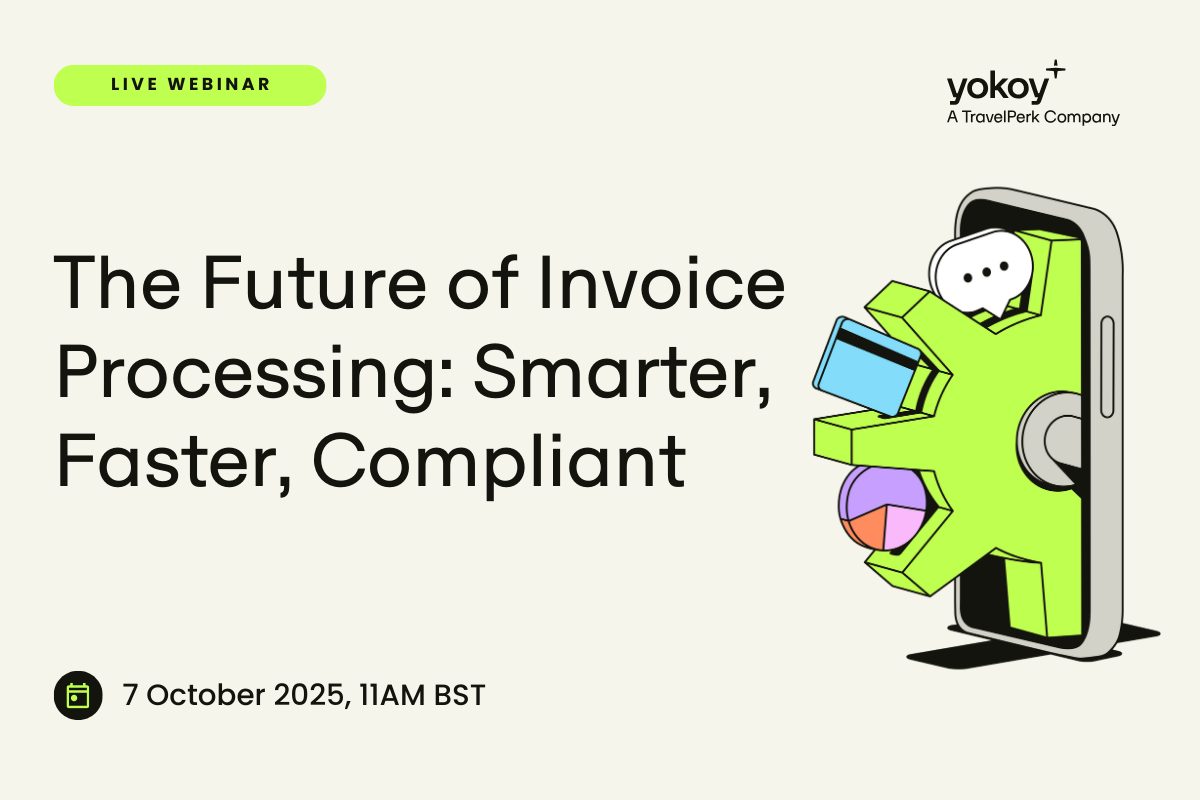
Have you experienced the frustration of dealing with invoices that fail to meet necessary standards? They often result in wasted time as you must reject and send back invoices for corrections. Even more concerning, the risk of penalties from tax authorities due to incomplete or inaccurate data can jeopardise your company’s compliance and record-keeping efforts. Explore how Yokoy’s automation platform mitigates these compliance challenges, ensuring seamless operations and peace of mind.
Which invoice data is needed?
Invoices seem to be a very common piece of paper or digital document that is transferred between consumers, businesses, authorities, and many more. That is why there are different aspects and standards you need to adhere to.
KYB requirements
KYB (Know Your Business) requirements on invoices are vital for confirming business identity and legitimacy. They include comprehensive details such as legal names, addresses, contact information, registration numbers, and Value Added Tax (VAT) identification numbers. This makes it easier for the accounts payable teams to identify secure trading partners.
Value added tax
Invoices for VAT compliance require specific details to calculate, report, and pay VAT accurately. This includes VAT numbers for both parties, clear identification such as invoice number and date, and itemised details with VAT rates and amounts. The invoice must show the total VAT applied, total payable, including VAT, and any exemptions or zero-rated items. Compliance is crucial to meeting tax authority regulations, preventing penalties, and ensuring accurate financial reporting.
Goods and services
Invoices should clearly describe goods and services with precise details and codes, including quantity, units, unit prices, discounts, and rebates to calculate a pre-tax subtotal. It’s also crucial to include delivery dates, shipping details, and transparent terms on payment, warranties, or service agreements to ensure accurate billing, efficient inventory management, and transparent transaction understanding.
Invoicing requirements for electronic invoices
To meet electronic-invoicing regulations, companies must adopt structured formats such as XML (extensible markup language), ensure secure transmission methods like end-to-end encryption, and follow regional standards like European EN 16931 and advanced electronic signatures. Integrating EDI (electronic data interchange) and CTC (continuous transaction controls) is essential, while Yokoy’s AI-powered spend management platform automates operations, boosts possible compliance, and enhances efficiency with real-time monitoring and validation.
Compliance requirements
Compliance requirements are the rules and regulations organisations must adhere to for legal and ethical operation. These encompass regulatory, corporate, environmental, financial, and data security standards, ensuring alignment with country-specific laws and internal policies. Compliance is crucial to prevent legal penalties, mitigate fraud risks, and enhance market trust. Yet, challenges include keeping up with changing laws, controlling expenses, and navigating the complexities of operating in various jurisdictions.
Digital signatures
Digital signatures are cryptographic tools that verify the authenticity and integrity of electronic documents by encrypting a unique document hash with a private key. They ensure documents are unchanged and from verified senders, commonly used for contracts, email security, and software distribution, providing security, efficiency, and compliance benefits. However, implementing digital signatures can be complex and expensive, necessitating strong key management and cybersecurity measures.
Electronic data interchange (EDI)
EDI facilitates the electronic exchange of standardised business documents like purchase orders (POs), invoices, etc., eliminating paper-based processes. It improves transaction speed, accuracy, and cost-efficiency, fostering stronger business relationships. However, EDI implementation can be complex and costly, necessitating system compatibility and robust security measures for data protection. Despite its benefits, EDI implementation can be complex and expensive, requiring compatibility between different systems and robust security measures to protect data.
Tax compliance
Tax compliance entails accurately reporting, calculating, and paying taxes, including filing returns, archiving records, and withholding taxes. It is essential for legal adherence and financial stability but faces challenges due to complex laws, regulatory changes, and international operations. Achieving effective tax compliance demands continual attention to detail and investment in resources.
Checklist for compliant invoice processing
Let’s summarise everything you need to consider in a checklist that keeps your invoices compliant:
Invoice data checklist
1. Header information:
- Invoice title: Label as “Invoice”
- Invoice number: Unique identifier
- Issue date: Date created
- Due date: Payment deadline
2. Seller’s information:
- Company name: Full legal name
- Address: Complete address
- Contact information: Phone and email
- Tax ID: VAT/GST or other tax number
3. Buyer’s information:
- Client’s name: Full name or company
- Address: Complete address
- Contact information: Phone and email
- Client’s tax ID: VAT/GST if applicable
4. Product/service details:
- Description: Item or service details
- Quantity: Units or hours
- Unit price: Cost per unit or hour
- Total line amount: Quantity x unit price
5. Financial summary:
- Subtotal: Total before taxes and discounts
- Discounts: Any applicable reductions
- Taxes: Breakdown of VAT, GST, etc
- Shipping costs: Additional charges, if any
- Total amount due Final amount payable
6. Payment details:
- Payment methods: Accepted methods (e.g., bank transfer, credit card)
- Bank information: For wire transfers
- Payment terms: e.g., “Payment due within 30 days”
- Late payment policy: Fees for overdue payments
7. Additional information:
- Purchase order number: Reference, if applicable
- Invoice notes: Additional comments or instructions
- Terms and conditions: Sale-related terms
- Return policy: If applicable
8. Legal and compliance:
- Legal disclosures: Mandatory legal info
- Compliance: Industry-specific requirements
- Currency: Stated currency
9. Visual/structural elements:
- Company logo: For branding
- Clear layout: Professional and easy-to-read
- Formatting: Correct alignment and readability
Final check:
- Data verification: Confirm the accuracy of all entered information
- Proofreading: Review for any spelling or numerical errors
- Compliance: Ensure legal and regulatory adherence
- Approval: Ensure the invoice is approved and ready for issuance
E-invoicing requirements checklist
E-invoicing compliance encompasses the legal and regulatory standards suppliers and buyers must follow when issuing and receiving electronic invoices. To ensure that vendor e-invoices are compliant, organisations need to address the following key aspects:
1. Authenticity of origin:
- Confirm that e-invoices are genuinely sent by the designated invoice issuer (seller) and not a fraudulent entity.
- Implement robust identification and authentication protocols.
- Both parties should utilise certificates to verify their authenticity.
2. Integrity of content:
- Protect the information in the e-invoice to ensure it remains unaltered after issuance.
- Employ advanced digital signatures that can detect any modifications to the data, rendering the signature invalid if tampering occurs.
3. Legibility:
- Ensure the e-invoice is provided in a readable format (e.g., XML, UBL) and remains legible throughout its validity period.
- Adhere to the accepted e-invoice formats of the recipient’s country. For instance, when sending invoices from the UK to Australia, use the Peppol format.
4. Storage:
- Maintain e-invoices in their original format.
- Ensure e-invoices are accessible for tax inspections and audits as local regulations require.
- In certain jurisdictions, such as Saudi Arabia, ensure the e-invoicing system supports exporting invoices and related notes to a local offline archive.
E-invoicing solution for stress-free compliant invoices
Yokoy can save your business a lot of time with its AI-powered spend management platform. Its full e-invoicing capabilities, automated matching processes, and possibilities for flexible API integrations can streamline financial processes and maintain regulatory compliance seamlessly.
Features that support your invoice compliance
- Automated compliance checks: Yokoy automates compliance checks within expense and invoice processing workflows, ensuring adherence to company policies and regulations to minimise errors and penalties. This reduces the risk of non-compliance and ensures all transactions are properly vetted.
- Full e-invoicing support: Yokoy supports global businesses with electronic invoice creation, transmission, and processing in compliance with industry standards. It uses secure methods to enhance transaction transparency and efficiency, making it easier to manage international invoicing requirements.
- Automated matching: Advanced OCR technology and AI algorithms automate invoice matching with POs or receipts. This streamlines processing, ensures accuracy, and significantly reduces manual workload and potential discrepancies.
- Smart line-item coding: AI-driven analysis allows for smart expense categorisation. This improves financial tracking and reporting accuracy, optimising resource allocation and providing a clearer picture of spending patterns.
- Flexible API integrations: Seamless integration with ERP, CRM, and financial systems enables real-time data exchange. This enhances operational efficiency and data accuracy, ensuring that all systems are up-to-date and aligned.
- Real-time invoice validation: Yokoy provides real-time validation of invoices, ensuring that all necessary information is present and correct before processing. This reduces delays and errors, ensuring a smoother invoicing process.
- Secure data handling: Utilises advanced encryption and secure storage solutions to protect invoice data and ensure confidentiality. This compliance with data protection regulations helps maintain the integrity and security of financial information.
By implementing Yokoy’s e-invoicing solution, businesses can achieve a stress-free invoicing process that is both efficient and reduces the risk of non-compliance, ensuring timely payments and minimising administrative burdens.
Next steps
Investing in a platform like Yokoy is essential because it can automate compliance checks, support full e-invoicing, automate matching processes, or offer flexible API integrations, to name just a few. Yokoy’s success stories show that it empowers businesses to optimise financial processes, reduce administrative burdens, and achieve greater transparency and control over their spending.
In this article
Simplify your invoice management
Book a demoRelated content
If you enjoyed this article, you might find the resources below useful.


